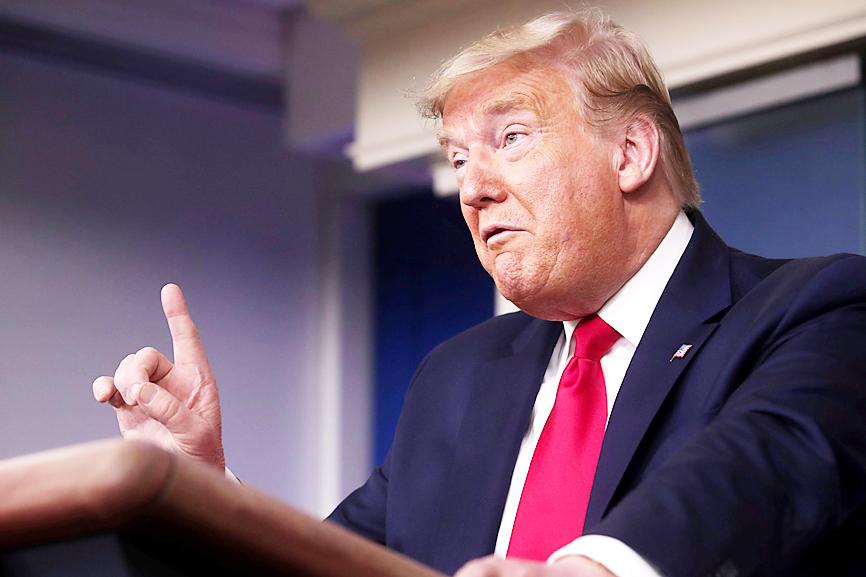US President Donald Trump on Thursday signed the Taiwan Allies International Protection and Enhancement Initiative (TAIPEI) Act of 2019 into law, before he talked with Chinese President Xi Jinping (習近平) by telephone about the COVID-19 pandemic.
The TAIPEI Act authorizes the US government to increase economic, diplomatic and security engagements with nations upgrading relations with Taiwan, or reduce such engagements with nations taking actions that seriously undermine Taiwan.
The act calls on Washington to advocate for Taiwan’s membership, or observer status, in international organizations, while encouraging the US trade representative to further strengthen trade and economic relations with Taiwan.

Photo: Reuters
It is the second piece of legislation directly related to Taiwan that Trump has signed.
On March 16, 2018, he signed the Taiwan Travel Act, which encourages visits between US and Taiwanese officials of all levels, and signals an upgrade of bilateral ties, following the US’ Taiwan Relations Act of 1979.
The latest bill, first introduced by US Senator Cory Gardner in May last year, was passed by the US Senate on March 11.
US Representative John Curtis introduced the bill in the House of Representatives, which unanimously passed it on March 4.
The US is one of Taiwan’s most important international collaborators, President Tsai Ing-wen (蔡英文) wrote on Facebook yesterday, thanking Trump for taking concrete action to expand relations with Taiwan and support its participation in the global community.
She also thanked Gardner for introducing the bill in the US Senate and Curtis in the US House of Representatives.
The TAIPEI Act is “a testament to #Taiwan-#US friendship & mutual support as we work together to address global threats to human health & our shared democratic values,” Tsai wrote on Twitter.
Presidential Office spokesman Alex Huang (黃重諺) said in a statement that the US is Taiwan’s most important international partner.
Taiwan would continue to strengthen collaboration with the US and other like-minded nations, Huang said, thanking Trump’s administration and the US Congress for their steadfast support.
Taiwan would advance partnerships around the globe based on the shared values of freedom, democracy and prosperity, he said, adding that the nation — as a force for good in the world — would continue to contribute to the global community.
Ministry of Foreign Affairs spokeswoman Joanne Ou (歐江安) said that the ministry would maintain its close ties with the US based on mutual trust and reciprocity, while working with other like-minded nations to achieve a greater global presence.

ENDEAVOR MANTA: The ship is programmed to automatically return to its designated home port and would self-destruct if seized by another party The Endeavor Manta, Taiwan’s first military-specification uncrewed surface vehicle (USV) tailor-made to operate in the Taiwan Strait in a bid to bolster the nation’s asymmetric combat capabilities made its first appearance at Kaohsiung’s Singda Harbor yesterday. Taking inspiration from Ukraine’s navy, which is using USVs to force Russia’s Black Sea fleet to take shelter within its own ports, CSBC Taiwan (台灣國際造船) established a research and development unit on USVs last year, CSBC chairman Huang Cheng-hung (黃正弘) said. With the exception of the satellite guidance system and the outboard motors — which were purchased from foreign companies that were not affiliated with Chinese-funded

PERMIT REVOKED: The influencer at a news conference said the National Immigration Agency was infringing on human rights and persecuting Chinese spouses Chinese influencer “Yaya in Taiwan” (亞亞在台灣) yesterday evening voluntarily left Taiwan, despite saying yesterday morning that she had “no intention” of leaving after her residence permit was revoked over her comments on Taiwan being “unified” with China by military force. The Ministry of the Interior yesterday had said that it could forcibly deport the influencer at midnight, but was considering taking a more flexible approach and beginning procedures this morning. The influencer, whose given name is Liu Zhenya (劉振亞), departed on a 8:45pm flight from Taipei International Airport (Songshan airport) to Fuzhou, China. Liu held a news conference at the airport at 7pm,

GRIDLOCK: The National Fire Agency’s Special Search and Rescue team is on standby to travel to the countries to help out with the rescue effort A powerful earthquake rocked Myanmar and neighboring Thailand yesterday, killing at least three people in Bangkok and burying dozens when a high-rise building under construction collapsed. Footage shared on social media from Myanmar’s second-largest city showed widespread destruction, raising fears that many were trapped under the rubble or killed. The magnitude 7.7 earthquake, with an epicenter near Mandalay in Myanmar, struck at midday and was followed by a strong magnitude 6.4 aftershock. The extent of death, injury and destruction — especially in Myanmar, which is embroiled in a civil war and where information is tightly controlled at the best of times —

Taiwan was ranked the fourth-safest country in the world with a score of 82.9, trailing only Andorra, the United Arab Emirates and Qatar in Numbeo’s Safety Index by Country report. Taiwan’s score improved by 0.1 points compared with last year’s mid-year report, which had Taiwan fourth with a score of 82.8. However, both scores were lower than in last year’s first review, when Taiwan scored 83.3, and are a long way from when Taiwan was named the second-safest country in the world in 2021, scoring 84.8. Taiwan ranked higher than Singapore in ninth with a score of 77.4 and Japan in 10th with